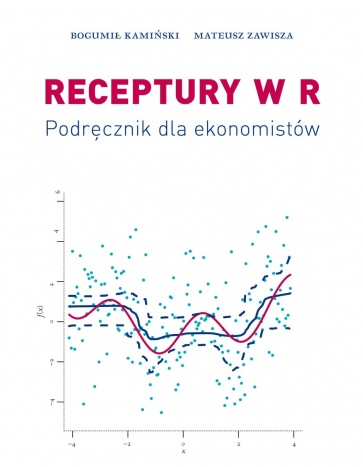
Organized conferences, workshops and summer schools
19th Workshop on Algorithms and Models for the Web Graph, 2024
18th Workshop on Algorithms and Models for the Web Graph, 2023
Conference: Contemporary Methods and Practices in Credit Scoring, 2021
17th Workshop on Algorithms and Models for the Web Graph, 2020
Summer School on Data Science Tools and Techniques in Modelling Complex Networks, 2019
Methods and Applications of Operations Research 2018 Conference
International Conference on Group Decision & Negotiation 2015
Major research grants
Methods and applications of advanced data analysis (The Polish National Agency for Academic Exchange NAWA)
New Economy Lab (The Polish National Agency for Academic Exchange NAWA)
Raising Open and User-friendly Transparency-Enabling Technologies for Public Administrations (Horizon 2020)
Methodology of construction of macroeconomic forecasts taking into account economic agent heterogenity (National Science Centre, Poland)
Structure of the social network, willingness to cooperate, and individual earnings: simulation model and empirical results (National Science Centre, Poland)
Data analysis course in the Julia language
A collection of interactive online projects using the Julia language: Hands-on Data Science with Julia.
Data Preprocessing: concentrates on exploratory analysis and data preparation for modeling; the user during the project will learn how to work with data frames from DataFrames.jl package and will be shown how data can be visualized
K-means and DBSCAN Clustering: begins with preparation of a data set for clustering using k-means and DBSCAN algorithms; for both methods the user will find optimal hyperparameter values and will validate the obtained results taking into account the comparison of grouping results from both algorithms
Dimensionality Reduction with PCA, t-SNE and UMAP: continues the analysis of the data set from the previous project; data are reduced to two- and three- dimensions using the PCA, t-SNE, and UMAP algorithms; using this approach it is possible to visualize the data set along with results of clustering using k-means and DBSCAN algorithms; for t-SNE and UMAP algorithms the user will employ the PyCall.jl package which allows to call Python libraries
Regression Using GLM and DecisionTree: is aimed at teaching how regression models can be created; the user performs the prediction of housing prices using linear regression and decision trees; in the project a process of hyperparameter tuning is peformed along with validation and comparison of created models using the GLM.jl and DecisionTree.jl packages
Classification with XGBoost: shows the task of classification using the XGBoost.jl library; during the project the user has a possibility to train an XGBoost models along with chioce of hyperparameters and implementation of custom variable importance algorithm; the results of the algorithm are next compared with variable importance calculation procedure that is in-built into XGBoost package, which allows to get additional business insights
SilverDecisions

In cooperation with M. Wasiluk, P. Szufel and M. Jakubczyk we have created SilverDecisions applications.
The software allows for creation and analysis of decision trees.
The application can be used in web browser at http://www.silverdecisions.pl.
The develpmnent page of the project is avaliable on GitHub.
Train Your Brain --- Challenging Yet Elementary Mathematics
Here you can find information about a book on solving mathematical problems I have written with Paweł Prałat. Additionally a free companion material giving an introduction to the Julia language is available there for download as a PDF.
The Julia Express

I am maintaining a consise Julia language introductory manual for programmers.
Document for Julia 1.6.1 can be downloaded here.
Document for Julia 1.4.2 can be downloaded here.
Document for Julia 1.0 can be downloaded here.
Document for Julia 0.6 can be downloaded here.
Document for Julia 0.5 can be downloaded as [PDF] [HTML] [Jupyter notebook].
Document for Julia 0.4 can be downloaded here.
Document for Julia 0.3 can be downloaded here.
EventSimulation.jl
An event based Discrete Event Simulation engine written in Julia language. Intended as a support library for teaching basic principles of Discrete Event Simulation.
Source code and documentation is available on GitHub
localsolver package
In cooperation with WLOG Solutions company I have prepared localsolver package for R language.
The package is available for download at The Comprehensive R Archve Network and allows for solwing of large-scale global optimization problems. It employs advanced algorithms from hybrid optimization engine LocalSolver.
Refined knowledge-gradient policy for learning probabilities
An implementation of algorithms presented in the paper Refined knowledge-gradient policy for learning probabilities (Operations Research Letters, 43, 2015) can be downloaded here.
Asynchronous Knowledge Gradient
An implementation in Java language of the Asynchronous Knowledge Gradient algorithm can be downloaded here.
Documentation of the algorithm is presented in paper:
B. Kamiński, P. Szufel: Asynchronous Knowledge Gradient Policy for Ranking and Selection, Winter Simulation Conference, Proceedings of the 2014 Winter Simulation Conference, A. Tolk, S. Y. Diallo, I. O. Ryzhov, L. Yilmaz, S. Buckley, and J. A. Miller, eds., s. 3785-3796, 2014
Data analysis with R handbook
Together with Mateusz Zawisza we have published a book (in polish)
Receptury w R. Podręcznik dla ekonomistów
about data analysis using R language.
It can be bought online at Oficyna Wydawnicza SGH.
On this website you can dowlnoad
WSE - Warsaw Simulation Engine

Warsaw Simulation Engine is a library written in Python 3.3.2 that allows to run discrete event simulations. It includes a set of example simulations using it.
WSE Releases
Version 1.0 WSE_v1.0.zip
Version 1.1 WSE_v1.1.zip
Development version BitBucket
PyCX
Together with Przemyslaw Szufel we take part in development of Project PyCX.
It is a simple simulation environment written in Python.
